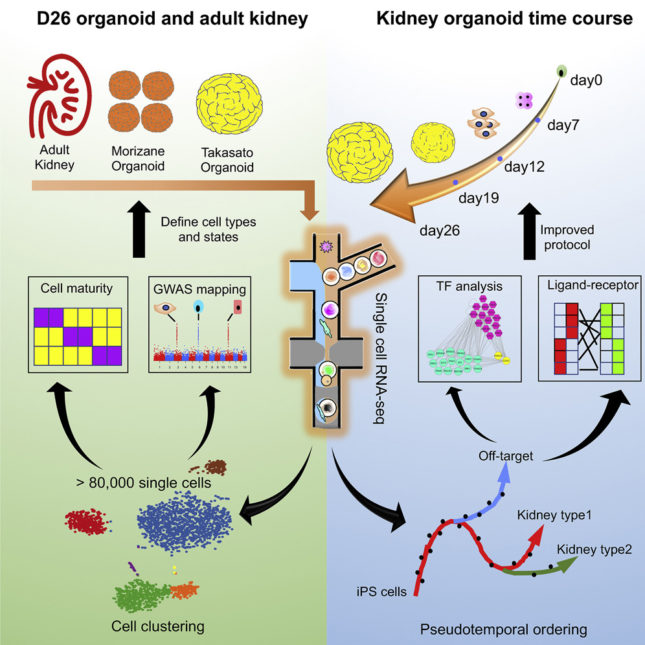The science of coaxing stem cells into kidney cells just became a little more refined.
Researchers in the Humphreys Laboratory in the Division of Nephrology at Washington University show that protocols used to grow kidney organoids from human stem cells can be modified to produce more kidney-specific cells and less “off-target” contaminating cells.
Organoids are clusters of cells grown in the laboratory to mimic an organ or specific tissues. Organoid cultures from a wide variety of tissues are currently used to study lung, gut, prostate, and brain function. Kidney organoids are potentially useful for tissue repair, disease modeling and screening drugs for nephrotoxicity. The presence of contaminating, non-kidney cells in the organoid, however, hinders the use of organoids.
In the current study, the researchers were the first to compare two commonly used differentiation protocols to grow kidney organoids from two separate human pluripotent stem cell (PSC) lines. They used single-cell RNA sequencing (scRNA-seq) and single-nucleus RNA-seq (snRNA-seq) to generate comprehensive molecular maps describing kidney organoid cell diversity.

Visual Abstract; Cell Stem Cell
The group found that both protocols generated similar outcomes, but had important differences in cell ratios and differentiation state. Both protocols produced at least 12 separate kidney cell types, but also produced “off-target” nonrenal cell types (10-20% of total cells). These contaminating cells, identified as brain and muscle cells, were present in all kidney organoids at similar ratios in human induced PSCs and human embryonic stem cells. However, when the protocol was refined to inhibit the signaling pathway of brain derived neurotrophic factor (BDNF) and its cognate receptor NTRK2, the off-target neuronal population was reduced by 90% without altering kidney differentiation.
The group also found that the types of kidney cells in the organoids were substantially immature compared with their fetal and adult counterparts.
Overall, results of the study will help guide future attempts to improve differentiation protocols for organoid maturation and better model physiological function. The study also highlights the power of single-cell technologies to characterize and improve organoid differentiation.
The study, “Comparative Analysis and Refinement of Human PSC-Derived Kidney Organoid Differentiation with Single-Cell Transcriptomics,” was published November 15, 2018, in the journal Cell Stem Cell. Authors are: Haojia Wu, Kohei Uchimura, Erinn L. Donnelly, Yuhei Kirita, Samantha A. Morris, and Benjamin D. Humphreys.
The publication has been featured in multiple news outlet articles, including ScienceDaily, The Scientist, Genetic Engineering & Biotechnology News, and Washington University’s The Source.